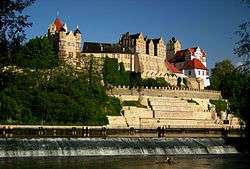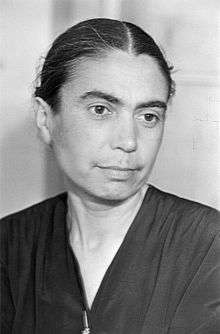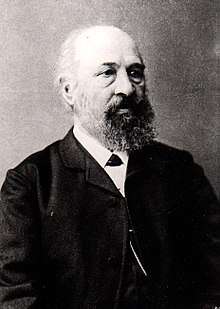Bernburg
| Bernburg | ||
|---|---|---|
 Bernburg Castle on the Saale river | ||
| ||
 Bernburg Location of Bernburg within Salzlandkreis district _in_SLK.png) | ||
| Coordinates: 51°48′N 11°44′E / 51.800°N 11.733°ECoordinates: 51°48′N 11°44′E / 51.800°N 11.733°E | ||
| Country | Germany | |
| State | Saxony-Anhalt | |
| District | Salzlandkreis | |
| Government | ||
| • Mayor | Henry Schütze (Ind.) | |
| Area | ||
| • Total | 113.45 km2 (43.80 sq mi) | |
| Elevation | 85 m (279 ft) | |
| Population (2017-12-31)[1] | ||
| • Total | 32,876 | |
| • Density | 290/km2 (750/sq mi) | |
| Time zone | CET/CEST (UTC+1/+2) | |
| Postal codes | 06406 | |
| Dialling codes | 03471, 034692 | |
| Vehicle registration | SLK, ASL, BBG, SBK, SFT | |
| Website | www.bernburg.de | |
Bernburg (Saale) is a town in Saxony-Anhalt, Germany, capital of the Salzlandkreis district. The former residence of the Anhalt-Bernburg princes is known for its Renaissance castle.
Geography
The town centre is situated in the fertile Magdeburg Börde lowland on the Saale river, approx. 40 km (25 mi) downstream from Halle and 45 km (28 mi) up stream from Magdeburg. It is dominated by huge Bernburg Castle featuring a museum as well as a popular, recently updated bear pit in its moat.
The municipal area comprises the villages of Baalberge, Biendorf, Gröna, Peißen, Poley, Preußlitz, and Wohlsdorf, all incorporated on 1 January 2010.
Bernburg is a stop on the scenic Romanesque Road (Strasse der Romanik).
History
Several archaeological sites in the area refer to the Walternienburg-Bernburg Culture, a mid-neolithic funnelbeaker culture from about 3200 to 2800 BC. Agriculture on the fertile Loess soil was already common in prehistoric times. Around 150 AD, a local settlement named Luppia was mentioned in the Geography by Ptolemy. In the Early Middle Ages, the Saale river marked the border between the German stem duchies in the west and the lands of the Polabian Slavs in the east.
The present-day borough of Waldau (which became part of Bernburg in 1871) was first mentioned in a 782 deed and again in 806 as Waladala in the chronicles of Moissac Abbey; the village church dedicated to St Stephen first appeared in 964, the nowadays building dates from around 1150. Bernburg itself was first mentioned as civitas Brandanburg in a 961 deed issued by King Otto I of Germany. According to the Annalista Saxo, Berneburch Castle, then a possession of the Ascanian prince Albert the Bear, was set on fire by his enemies in 1138. In 1252 the rebuilt castle became the residence of Albert's great-grandson Prince Bernhard I of Anhalt-Bernburg in 1252.
Bernburg memorial
In the Nazi era during World War II, a wing of the town's mental hospital was used for the so-called T-4 Euthanasia Programme. The site today houses a memorial to commemorate the suffering of more than 14,000 victims.
International relations
Bernburg is twinned with:






Personalities
Honorary citizen
Date of award
- April 10, 1890: Otto von Bismarck (1815-1898)
- 7 April 1937 - 26 March 1946: Hermann Göring (1893-1946)
- 12 June 1938 - 26 March 1946: Johann Ludwig Graf Schwerin von Krosigk (1887-1977)
All appointments of honorary citizens and the like from 1933 to 1945 were annulled. [2]
- February 24, 1950: Johannes R. Becher (1891-1958)
- 19 February 1953: Hermann Henselmann (1905-1995)
- February 5, 1967 -?: Hilde Benjamin (1902-1989)
Sons and daughters of the city
- Christoph Rothmann (1550-1600), mathematician and astronomer of the 16th century
- Sibylla of Anhalt (1564-1614), Duchess of Wurttemberg
- Wilhelm Heinrich Sebastian Bucholz (1734-1798), official physician
- Isaak Markus Jost (1793-1860), historian

- Ferdinand Reich (1799-1882), chemist and physicist
- Hans Reinowski (1900-1977), politician
- Herbert Weißbach (1901-1995), actor
- Hilde Benjamin (1902-1989), presiding judge in a series of political trials in the 1950s and Justice Minister of the GDR
- Otto Knefler (1923-1986), soccer coach and player
- Gerhard Dünnhaupt (born 1927), bibliographer and cultural historian
- Michael Müller (born 1948), politician
- Rolf Milser (born 1951), weight lifter
- Heike Hartwig (born 1962), athlete
- Ingo Weißenborn (born 1963), fencer
People who have worked on the ground
- Christian II, Prince of Anhalt-Bernburg (1767-1834), Prince and Duke of Anhalt-Bernburg
- Friedrich Adolf Krummacher (1767-1845), theologian, general superintendent in Bernburg 1812-1824

- Wilhelm von Kügelgen (1802-1867), early-romantic painter and author, in the service of the court of Bernburg
- Richard Wagner (1813-1883), worked in 1834 in the Bernburg Hoftheater (Mozart operas)
- Hermann Hellriegel (1831-1895), biologist and agricultural scientist in Bernburg 1880-1895
- Wilhelm Krüger (1857-1947), 25 years director of the agricultural test station Bernburg
See also
References
- ↑ "Bevölkerung der Gemeinden – Stand: 31. Dezember 2017" (PDF). Statistisches Landesamt Sachsen-Anhalt (in German).
- ↑ Beschluss der Magistratssitzung der Stadt Bernburg vom 26. März 1946 – Stadtarchiv Bernburg Findbuch 8/II-675
External links
| Wikimedia Commons has media related to Bernburg. |
| Wikisource has the text of the 1911 Encyclopædia Britannica article Bernburg. |
.png)